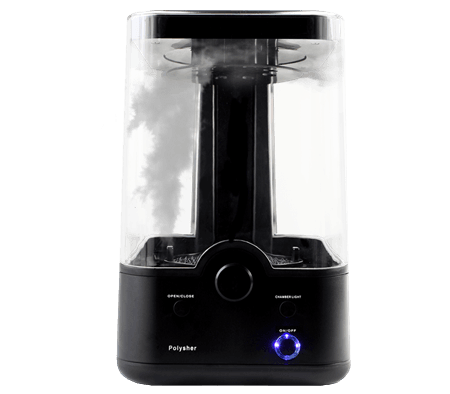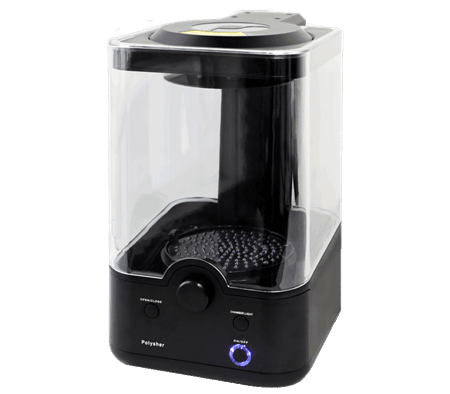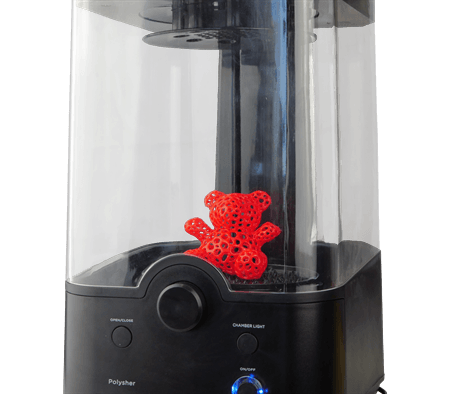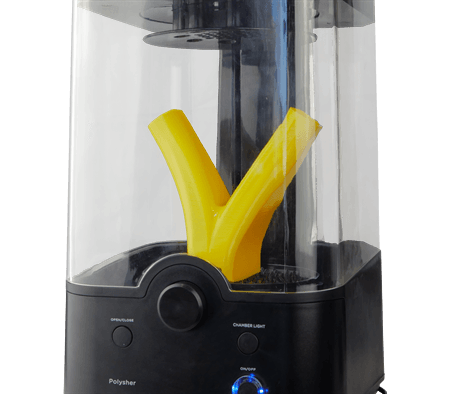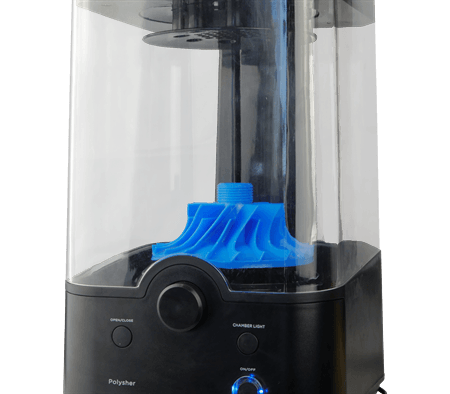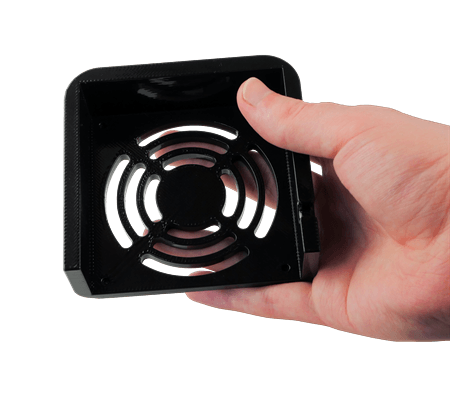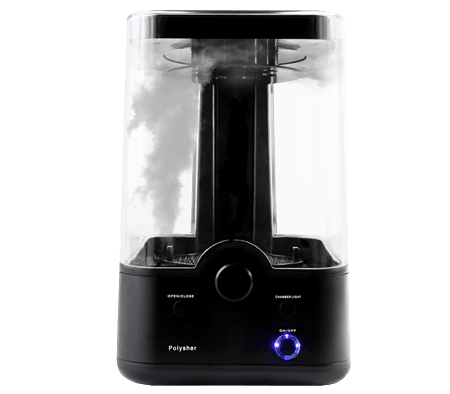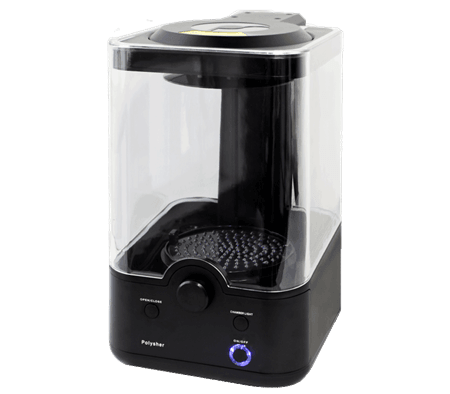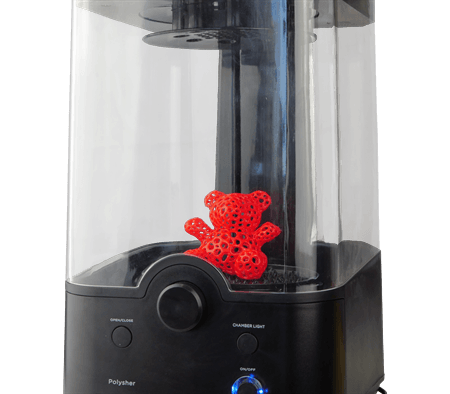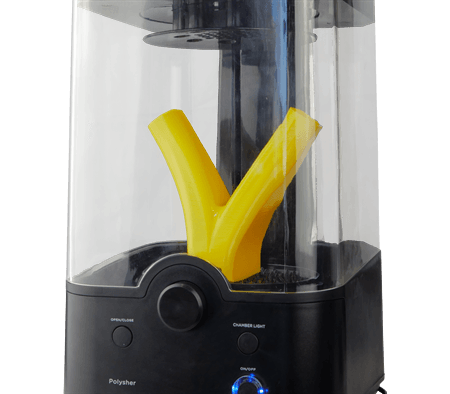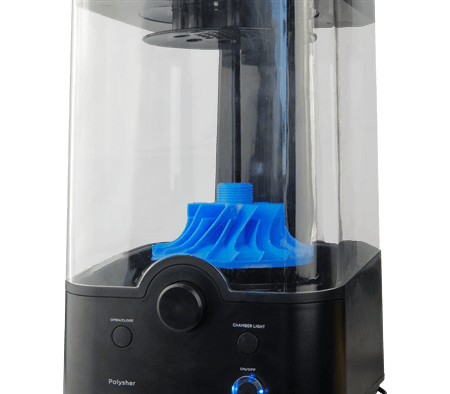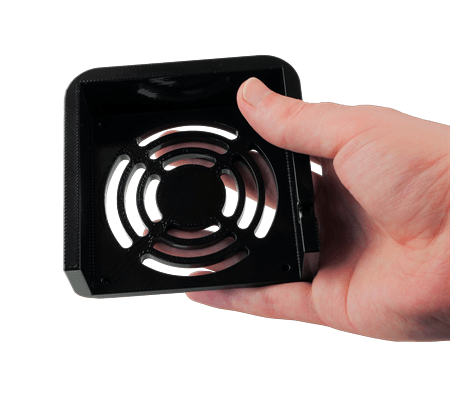Polymaker
Polymaker Polysher (Post-processing machine)
Polymaker Polysher (Post-processing machine)
Out of stock
Couldn't load pickup availability
The innovative Polysher improves, smooths and glosses the surface of 3D printed parts with Polymakers nebulised polyshing technology! This product is compatible with PolySmooth & PolyCast filament.
The Polysher™ is a desktop post processing unit designed to remove layer lines from PolySmooth™ and PolyCast™ prints. The Polysher™ uses Polymaker’s Layer-Free™ technology to create a fine mist of isopropyl alcohol which evenly smooths the model.

Key Features
Professional Surface Quality - The Polysher™ is a reliable and automatic solution which improves the surface quality of 3D printed parts, achieving a professional smooth and glossy surface.
Intuitive & Easy To Use - The Polysher™ is designed to be intuitive and easy to use, simply turn the control dial to select your polishing time and sit back. The polishing process typically takes between 20 - 40 minutes for most models.
Safety First - The Polysher is air tight sealed so no spark can be generated inside the chamber. Polymakers Layer-Free™ technology uses cold liquid-phase polishing rather than heated vapour-phase smoothing, a safer form of post-processing. The Polysher's lift design also ensures IPA is contained inside the chamber when removing parts while the integrated smart electronics ensure maximum safety in work and education environments.
Detail Maintained - With Polymakers Layer-Free™ technology, the fine mist of isopropyl alcohol evenly coats the part while preserving details and dimensions.
Low Costs - The Polysher™ is an affordable solution which requires only a very small reservoir of Isopropyl Alcohol, recycling run-off IPA for efficient and low cost polishing.




Technology
Polysher™ uses Polymaker's Layer-Free™ technology: Layer-Free™ technology involves exposing a 3D printed part to an aerosol of micro-sized alcohol droplets, generated by a rapidly vibrating, perforated membrane called the nebuliser. The aerosol will then be adsorbed by the surface of the 3D printed part and render it smooth and layer-free.

Safety
Polymakers technology is intrinsically safer than other smoothing techniques:
- No heating is involved
- The nebuliser technology requires only a very small reservoir
- Isopropyl Alcohol is safer than smoothing chemicals like Acetone or MEK
- It is a liquid-phase polishing rather than vapour-phase polishing process (the latter is more dangerous for a number of reasons)
Polymaker have also implemented a number of safety features into the machine:
- Multiple sensors to detect any sign of malfunction of the nebuliser (e.g. running dry)
- Chamber open/close sensor (the machine won’t start if the chamber is open, and will automatically terminate if the chamber is accidentally open during polishing)
- All electronic components (running at very low voltages) are properly sealed, and no spark can be generated inside the chamber.
Operation

- 3D print your part with PolySmooth™ or PolyCast™ (sold separately), just like what you normally do with PLA;
- Fill the reservoir with isopropyl alcohol. (NOTE - Do not fill the reservoir with other liquids or solvents other than isopropyl alcohol or ethanol as this will damage the Polysher™.)
- Place your printed part in the Polysher™;
- Set the polishing time by turning the knob; a typical part takes 20 - 40 minutes, depending on the size of your part.
- Once polishing is finished, the stage will automatically lift up for you to easily get the part.
Operating the Polysher™ is that easy!
Specs
Technology - Nebulised Aerosol Polishing
Compatible Material - PolySmooth™
Polishing Liquid - Isopropanol or ethanol, 70% or above [90% or higher recommended]
Polishing Time - 10 – 30 min typical (depending on part size)
Product Dimensions - 230 x 270 x 370 mm
Maximum Polishable Part Size - 150mm diameter x 180mm height
Operating Temperature - 15 – 32 °C
Storage Temperature - 0 – 38 °C
Power Requirements - 100 – 240 V, 2A max, 50/60 Hz
Materials
Materials
PLA - This solid filament is used to make models that are a refined representation with rigid properties.
TPU - This flexible filament holds the shape of the model and can with stand being twisted and squashed to survive the field environment.
Shipping
Shipping
Free standard shipping and Express for free orders over $300 calculated at the checkout.
All items are shipped from Townsville, QLD.
Shipping World Wide - coming soon.
Care Instructions
Care Instructions
PLA
Temperature:
Keep it cool! PLA starts to soften at around 60°C (140°F), so avoid placing it near heat sources or leaving it in hot cars.
Sunlight:
Prolonged direct sunlight can cause fading and potential deformation. Try to keep it out of long sun exposures.
Cleaning:
Gently wash with warm water and a bit of mild soap using a soft cloth. No harsh scrubbing, please!
Handling:
Handle with care—avoid excessive bending or dropping it, as PLA is rigid and can crack or break.
Storage:
Store in a cool, dry place to maintain its shape and longevity.
TPU
Temperature:
TPU is built to be flexible, but still avoid extreme or prolonged heat. It’s more resilient than PLA, but unnecessary heat can still degrade it over time.
Sunlight:
Try not to leave TPU items in direct sunlight for too long, as UV rays can fade the colors and slowly affect the material quality.
Cleaning:
Just like PLA, a quick clean with warm water and mild soap works great. Use a soft cloth and don’t be too rough.
Handling:
Enjoy its flexibility! However, even though TPU can bend, continuous stretching or heavy impacts might wear it out faster.
Storage:
Keep it in a cool, dry spot away from harsh elements to maintain its flexibility and appearance.
Share
